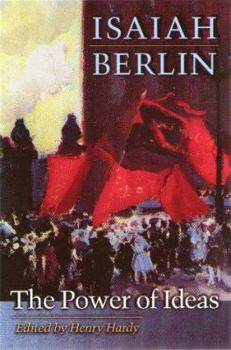Power of Ideas
Select Format
Select Condition 
Book Overview
The essays collected in this new volume reveal Isaiah Berlin at his most lucid and accessible. He was constitutionally incapable of writing with the opacity of the specialist, but these shorter, more introductory pieces provide the perfect starting-point for the reader new to his work. Those who are already familiar with his writing will also be grateful for this further addition to his collected essays. The connecting theme of these essays, as in the case of earlier volumes, is the crucial social and political role--past, present and future--of ideas, and of their progenitors. A rich variety of subject-matters is represented--from philosophy to education, from Russia to Israel, from Marxism to romanticism--so that the truth of Heine's warning is exemplified on a broad front. It is a warning that Berlin often referred to, and provides an answer to those who ask, as from time to time they do, why intellectual history matters. Among the contributions are "My Intellectual Path," Berlin's last essay, a retrospective autobiographical survey of his main preoccupations; and "Jewish Slavery and Emancipation," the classic statement of his Zionist views, long unavailable in print. His other subjects include the Enlightenment, Giambattista Vico, Vissarion Belinsky, Alexander Herzen, G.V. Plekhanov, the Russian intelligentsia, the idea of liberty, political realism, nationalism, and historicism. The book exhibits the full range of his enormously wide expertise and demonstrates the striking and enormously engaging individuality, as well as the power, of his own ideas. "Over a hundred years ago, the German poet Heine warned the French not to underestimate the power of ideas: philosophical concepts nurtured in the stillness of a professor's study could destroy a civilization."--Isaiah Berlin, Two Concepts of Liberty , 1958
Format:Hardcover
Language:English
ISBN:069105018X
ISBN13:9780691050188
Release Date:February 2000
Publisher:Princeton University Press
Length:256 Pages
Weight:1.28 lbs.
Dimensions:1.0" x 6.0" x 9.0"
Customer Reviews
1 rating
A demonstration of the power of ideas in uplifting the human spirit
Published by Thriftbooks.com User , 19 years ago
This book contains essays on a diverse set of topics by the great modern master of the History of Ideas, Isaiah Berlin. The opening essays in which he traces his intellectual path as a philosopher are of the highest possible interest. For we learn how Berlin came in the thirties to meet with those purists who insisted a a statement to be meaningful had to be verifiable. Berlin traces his own reservations from a narrow Logical Positivism into the broad study of the History of Ideas. He tells the story of how commissioned to write a work on Karl Marx he came to investigate his predecessors, and was led to those European Enlightentment thinkers the interpretation of whose work became one central contribution of his own to modern thought. Helvetius, Holbach, de Maistre, Condorcet, were the subject of explorations in understanding passionate thinkers whose ultimate models for Ideal Political Reality he would have reservations from, but who generally he would have great sympathy for. Another important section of the work has to do with Berlin's relation to the rise of modern Israel, to Zionism, and to his own great mentor, the great scientist and first President of Israel, Chaim Weizmann. Berlin's writing is characterized by vigor and human insight, by sudden sweeps of thought which dazzle and brighten. He is a wonderful writer and thinker. There is not a work of his I would not highly recommend. And this is no exception.





